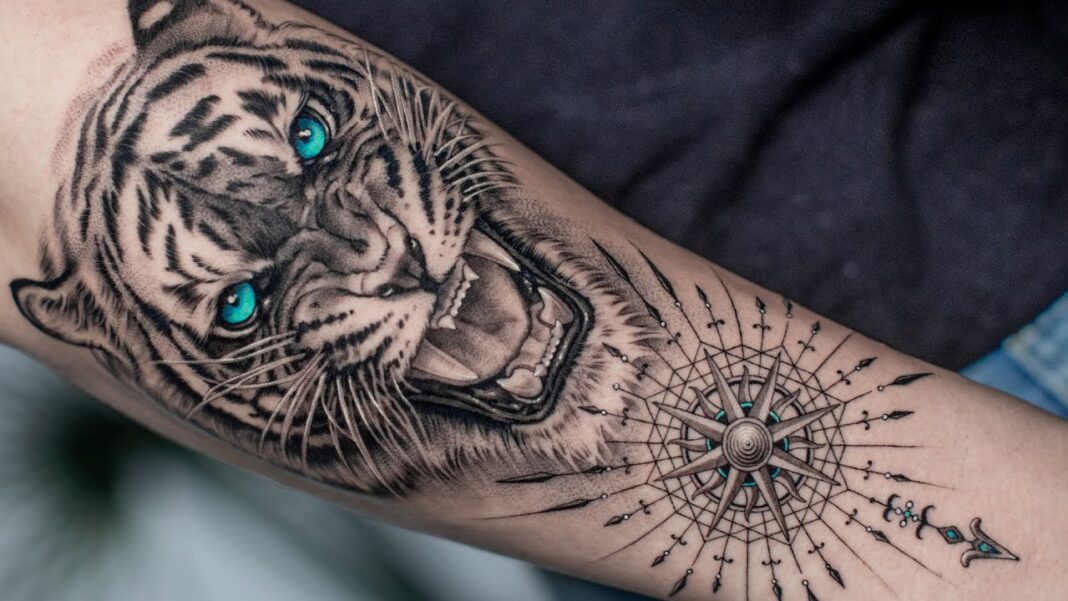Asians consider the tiger the King of the Jungle, as Africans regard the lion. Tigers are deadly predators, famous for their ability to stalk and kill prey without detection. For this reason, many people like getting tiger tattoos.
Asian cultures largely influence the modern perception of tiger tattoos. Read on to discover the meaning of the tiger tattoo according to different Asian cultures.
Significance of Tiger Tattoos in Chinese Culture
In Chinese culture, tigers signify courage, dignity, ferocity, and sternness. People also regard tigers as protectors of the dead, helping them to live in peace in the afterlife.
The living see tigers as a protection symbol and associate it with Tsai Shen Yeh, the Chinese god of wealth. In South Asia, people link tigers to Durga, the goddess of war. These associations linking tigers with divinity and power highlight the ability of humans to harness raw power and spirituality.
Additionally, Chinese mythology regards the white tiger as Venus, one of the five classical planets. It also links it with the season Autumn, the element of metal, and the west direction of the compass. Some claim that this mythical creature only appears when a king leads his people with virtue and all regions under his reign are peaceful.
Chinese tiger tattoos range from big to small and mostly appear on the hands, chest, and back.
Significance of Tiger Tattoos in Thai Culture
Most Thai tiger tattoos feature two tigers facing each other, surrounded by lettering. The text and images are often symmetrical. These tattoos signify power, protection, speed, and stealth, typical tiger characteristics. They also represent compassion from an emotional perspective.
Thai people believe having tiger tattoos can improve your luck with finances and business negotiations. Some claim that body art can protect them against natural disasters.
Sak Yant is Thai for mantra tattoos, which include tigers sometimes. Tiger Yant tattoos are popular among military and security enforcement agencies.
Significance of Tiger Tattoos in Japanese Culture
The white tiger is one of Japan’s four sacred animals. White tigers are rare and difficult to spot, so white tiger tattoos signify rarity and uniqueness. They also indicate longevity and strength.
In Japan, white tigers symboliseFall and the North. It is linked to the earth, with some claiming it controls nature, particularly the wind.
Tiger Tattoos for Animal Rights Activists
In the past, poachers targeted tigers for their bones and beautiful skin. Three tiger breeds are extinct because of climate changes, human-wildlife conflicts, and poaching. Many stage shows and carnivals also abused tigers, resulting in severe injury and death. These discoveries prompted people to step up and make changes to save the endangered tigers.
Conservation and zoos have helped in the drive to save tigers. However, some individuals like to spread awareness by getting tattoos. So far, it’s proving to be an effective way of drawing the public’s attention to tiger conservation.
Modern Perception of Tiger Tattoos
In today’s world, tiger and other animal tattoos are totems that showcase their style. Tiger tattoos mainly represent power and strength. They also increase chances of luck and good fortune.
Is a Tiger Tattoo Worth It?
Nobody should discourage you from getting a tiger tattoo. Public opinion is irrelevant whether you want to get the tattoo for beauty or animal rights activism. These tattoos suit everyone, regardless of age, gender, sexual orientation, social status, etc.
Regarding placement, it depends on your preferences. Most people like tiger tattoos on the back, chest, biceps, and forearms. Because these tattoos are often large, they don’t work well on fingers. Other suitable spots include the shoulders, stomach sides, and lower back. If you fancy thigh tattoos, you can get them too.
Wrapping Up
Tiger tattoos have several meanings in different cultures, but they most signify power and strength. Besides these positive connotations, the tattoos can signify vengeance and ferocity, mainly because of the tiger’s natural aggression.








